| |
“So you see, my dear friend, that I am full of contradictions, and although I continue to mature in years, neither religion nor philosophy has yet to soothe my restless spirit. Truly one should go mad were it not for music. This is, as a matter of fact, the best gift from heaven to a humanity wandering around in the darkness. Only it alone can provide enlightenment, calm and reconciliation. It is not just a straw in the wind, but a genuine friend, protector and comforter, and it alone makes life worth living. Indeed, perhaps there will be no music in heaven. Let us enjoy it here on Earth while we are alive.” |
| |
Pyotr Ilyich Tchaikovsky in a letter to Nadezhda von Meck* |
Back in the winter of 1985, when Milos Forman’s Amadeus first hit UK screens, it came up in a conversation between myself and an older work colleague who was a bit of a classical music afficionado. I’d hugely enjoyed the film, and given that it went on to do solid box-office business and win a startling eight Academy Awards – including Best Film and Best Director – I clearly wasn’t alone. My colleague, however, hated it. He complained that it didn’t feature enough of Mozart’s music, despised the presentation of Mozart as a spoilt and giggling child, was really ticked off that it did not cover key aspects of his life, and had major issues with the sometimes speculative games played with recorded historical fact. It was clear to me that what my colleague that what he really wanted was a biographical documentary, something Forman’s film was clearly never intended to be. Given his response, and knowing that he was also a fan of celebrated Russian composer Pyotr Ilyich Tchaikovsky, I suggested that he should steer well clear of Ken Russell’s 1971 The Music Lovers. The wildly theatrical eyeroll and groan that greeted my words left me in little doubt that my advice had been delivered too late to be of practical use.
As a confirmed fan of the music of Tchaikovsky and of the cinema of Ken Russell, I, on the other hand, was naturally disposed to love a film made by the latter about the former. Despite my advanced years, I was not quite old enough to see The Music Lovers on its initial theatrical release, but did catch it on the big screen a few years down the line, either at the National Film Theatre or one of the many independent screens that once made London a mecca for southern UK-based film devotees. I distinctly remember being thrilled by the sheer energy of Russell’s filmmaking and the intensity of Richard Chamberlain’s performance, having my young eyes widened by the sight of a naked Glenda Jackson, smiling widely in delight at the sheer audacity of the 1812 Overture sequence, and being horrified by the very idea that anyone could hope to cure cholera by dropping a seriously infected patient into a bath of boiling hot water. If none of the above makes a whole lot of sense, then you’ve clearly never been exposed to the very specific pleasures of this bold, dynamic, cinematically electrifying and – oh yes – controversial work from one of British cinema’s more talented and unapologetically fearless creators.
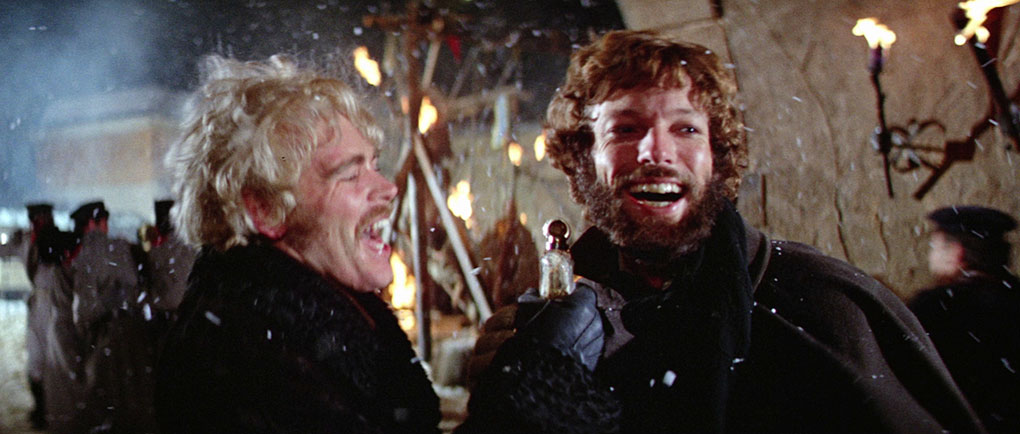
As would also later be the case with Amadeus, if you’re hoping for a detailed and reverentially accurate biopic, you’ve come to the wrong movie. The Music Lovers is, to combine two astute observations made by Matthew Melia in his excellent commentary on this disc, both an expressionist and impressionist work, a simultaneously instinctive and deeply thoughtful audiovisual response by one artist to the life and work of another. This is gut reaction cinema, but executed with a technical skill and artistry that too frequently went unappreciated in contemporary reviews, and is often still undervalued in the face of the film’s extraordinary verve. Evidence of this is provided aplenty in the film’s vibrant opening scene, which takes place during a winter fair as budding composer Pyotr Ilyich Tchaikovsky (Richard Chamberlain) and Count Anton Chiluvsky (Christopher Gable) – a man that we soon learn is his lover – joyously tobogganing down a man-made ice slope, then scrabbling back up like a pair of excited children to have another go. As the two then enjoy a ride on a suspended roundabout, the camera drifts fluidly over to the figure of Nina (Glenda Jackson) – full name Antonina Miliukova – and in an almost invisibly complex move, follows her as she trots merrily up to a balcony to shadow a handsome, horse-mounted Lieutenant (Ben Aris), then catching his eye by throwing a snowball at his head, a prank he reacts to with friendly amusement. Around them, crowds bustle, enjoying the day, while acrobats tumble, musicians play, and dancers dance, and Pyotr and Anton finally head home in a carriage holding torches triumphantly aloft and then fall exhausted into Pyotr’s bed, all of which plays out to the boisterous strains of The Dance of the Clowns from Tchaikovsky’s The Nutcracker Suite.
The extraordinary energy of the sequence is undeniable, and while on a first viewing it may seem a little chaotic, return to it after watching the whole film and it becomes clear that there’s not a random note here. Take this one short sequence as an example, which begins with the camera framed on the unamused face of a woman as she is joined by giggling and identically uniformed children, then pulls back rapidly in a gorgeously executed move across the stage and through and energetic group of dancers. Visually arresting it may be, but not for the sake of it, as this also provides with our first glimpse of Nadezhda von Meck, the woman who would soon become Pyotr’s patron, and hints at her position of authority when she turns away and the children accompanying her all do likewise in synchronised unison. A dancer pulled from the stage and abused by drunken soldiers prefigures the treatment that Nina will later receive at the hands of the officer she has naively idolised, and the behaviour of these soldiers repels a man who turns out to be Pyotr’s brother Modeste (Kenneth Colley), who protectively ushers yooung son away from the scene. Every bit as unimpressed with the festivities is Pytor’s sister Sasha (Sabina Maydelle), whom we first see being led through the boisterous crowd by her husband Davidov (Andrew Faulds), all the while doing her best to ignore the two masked figures that are playfully hassling the couple, who are revealed shortly after to be Pyotr and Anton. Tellingly, after they remove their masks, Pyotr’s good humour momentarily falters as he makes a move to follow his sister and presumably apologise for their behaviour, but is quickly led away by the resolutely upbeat Anton. These are all moments that only really resonate on a second viewing, when as a slyly layered introductory sequence, it really shines.
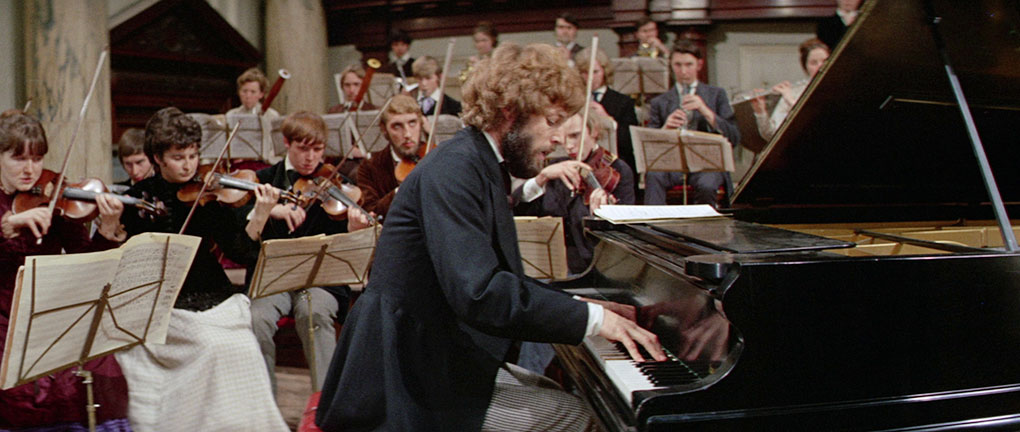
Two soon-to-be intertwined stories then unfold, as Pyotr plays his first major composition, Piano Concerto No. 1 in B-Flat Minor, Op. 23, for an audience at the conservatoire at which he is employed, backed by an orchestra of conservatoire students, and Nina lusts after and composes a letter to the dashing young Lieutenant that she has become so bewitched by. Despite their differences, the two stories have their direct parallels. Both Pyotr and Nina enjoy a momentary triumph that is then soundly dashed by the cruelty of individuals in positions of nominal power. Initially buoyed by the rapturous audience reaction to his composition, Pyotr’s elation is immediately undercut by his employer, Anton Rubinstein (Max Adrian), who mocks his composition and describes it condescendingly as “bad, vulgar, woman’s stuff” and refuses to allow a public performance until it has been completely rewritten, something Pyotr angrily refuses to do. Having attended the con cert herself and even briefly bumped into the man she will later marry, Nina is then overjoyed to discover that the Lieutenant has responded to her letter and accepted her invitation to visit her, unaware that he has been drinking heavily and has anything but romance on his cruel and chauvinistic mind.
The conservatoire concert itself is a vigorously staged and filmed set-piece that also expands intriguingly on the characters and narrative. When Pyotr makes eye contact with Sasha, for example, the two share a fantasy in which they are walking hand-in-hand in woodland, playfully rowing on a lake, and peacefully settling down as a family with Modest and Davidov in an isolated cottage in country. That these sequences are shot in the manner of a lush commercial – all slow-motion imagery and backlit lighting, and including a sequence in which Pyotr is harvesting wheat in a baking sun and is brought refreshing lemonade by a smiling Sasha – was clearly a deliberate decision on Russell’s part. Similarly idealised, but shot and edited with more calculated vigour, is Nina’s fantasy about taking a boozy carriage ride with the Lieutenant, whom she pictures dressed in white instead of the black uniform he wears to the concert. When her daydream concludes, she discovers to her intense disappointment that the Lieutenant, behind whom she was hopefully sitting, has become so bored that he has left the concert hall. Arriving late to the performance, meanwhile, is Madame von Meck, who is visibly moved by what she hears and whose status is confirmed by the box seat she occupies that directly overlooks and towers over the stage.
Complaints that the film puts too much emphasis on Tchaikovsky’s homosexuality feel misplaced, as it’s not Tchaikovsky’s sexuality that concerns screenwriter Melvyn Bragg and director Russell, but the fact that he lived and had ambitions in a society in which openly admitting to being gay would not only finish his career, but see him publicly ostracised, a glum situation that in no way was confined to 19th century Russia. In Russell’s hands, Pyotr’s homosexuality instead becomes a metaphor for the artist as a tortured outsider, forced by societal conventions and expectations to hide his true self behind a mask of prescribed respectability. Torn between the man he really is and the one that others expect him to be, he sees marriage as a logical and even desirable move, but in truth seeks a wife purely as a front, not as a romantic or a sexual partner. It’s this, rather than any incestual desire, that prompts him to respond to Sasha’s question about why he hasn’t married with, “I would… if I could marry someone like you.” Unfortunately for everyone, Nina, following her brutal rape by the drunken Lieutenant (an unseen act that is communicated through a carefully arranged shot of its grim aftermath), instead switches her focus to Pyotr, who too readily responds to her introductory letter, and the two are married before either are aware of what they’ve let themselves in for.
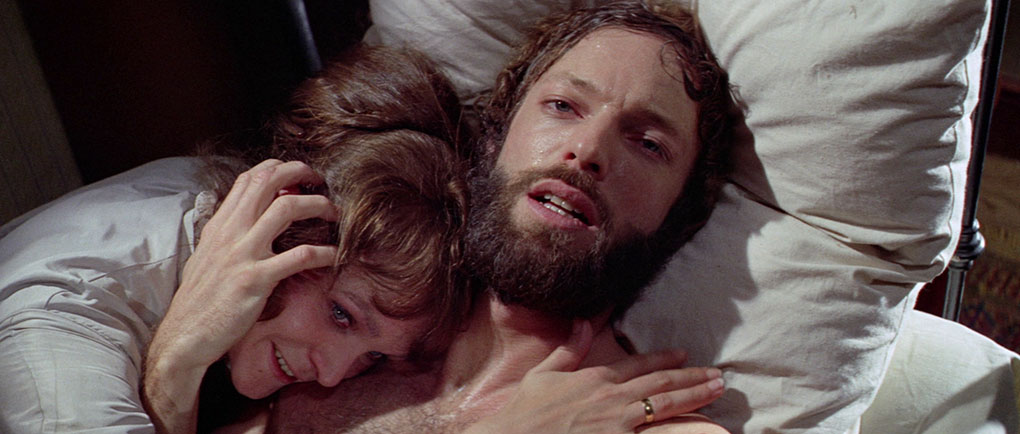
The impossible mismatch of desires this creates is incisively captured in one of the film’s most controversial but brilliantly handled scenes. After their St. Petersburgh honeymoon quickly takes a tetchy turn, Pyotr and Nina elect to head back to Moscow, and during the train journey become hopelessly drunk in their private train carriage, and Nina strips off in the hope of finally seducing her reluctant new husband, but instead ends up passed out on the carriage floor. Pyotr reacts to the sight of her naked body being rocked back and forth by the movement of the train with undisguised horror, a reaction triggered by a childhood trauma in which he saw his beloved but cholera-ridden mother dropped naked into a scoldingly hot bath in a lethal piece of medical quackery, the haunting memory of which is disturbingly visualised during a party at Rubinstein’s house in which Pyotr comes close to a complete mental breakdown. From this point on it’s a downhill slide for a marriage that never really had a chance. A touch ironically, Pyotr’s friendship with Nadezhda von Meck is in many ways the one he has been so earnestly seeking, but as part of their agreement Nadezhda has specified that the two should never meet, a stipulation that makes it impossible for her to fulfil the required role of a symbolic wife. That said, her love of Pyotr’s music soon grows into that of a possessive partner, prompting her to react with the jealous fury of a spurned lover at the news that Pyotr has married Nina. For her, the man and his music have become one and the same, and by falling in love with the former she has inevitably found herself also bewitched by its creator.
By scoring the entire film with Tchaikovsky’s music and by shooting whole sequences with the aim of precisely cutting them to specific musical movements, Russell anticipates the narrative-based music videos of years to come and lays the artistic and technical groundwork for his glorious 1975 audiovisual interpretation of The Who’s concept album, Tommy. This is initially evident in the opening scene, but is even more pronounced in the multi-layered and complex Piano Concerto No. 1 set-piece, notably as the action slips into Nina’s fantasy, and the film cuts back and forth between the concert and the legs of carriage horses that appear to galloping in perfect sync with the music. This wedding of imagery and music hits a climactic peak during the extraordinary late film fantasy sequence in which every action, every camera move and every edit is driven by the majestic climax of Tchaikovsky’s 1812 Overture. Here, Russell lets the symbolism run wild, with Modeste portrayed as a money-grabbing huckster, Pyotr chased and tormented by his memories and human tormentors, then is lauded by the masses and immortalised in stone. As the composition hits is famed cannon-assisted climax, the guns are lit and aimed by a playful Modeste and used to blow the heads off of all of the individuals who have had a significant impact on his brother’s life. The only survivor of this onslaught is a smiling Nina, whose terrible fate by this time has already been sealed and is unflinchingly portrayed in one of Russell’s most justifiably unhinged and disturbing scenes.
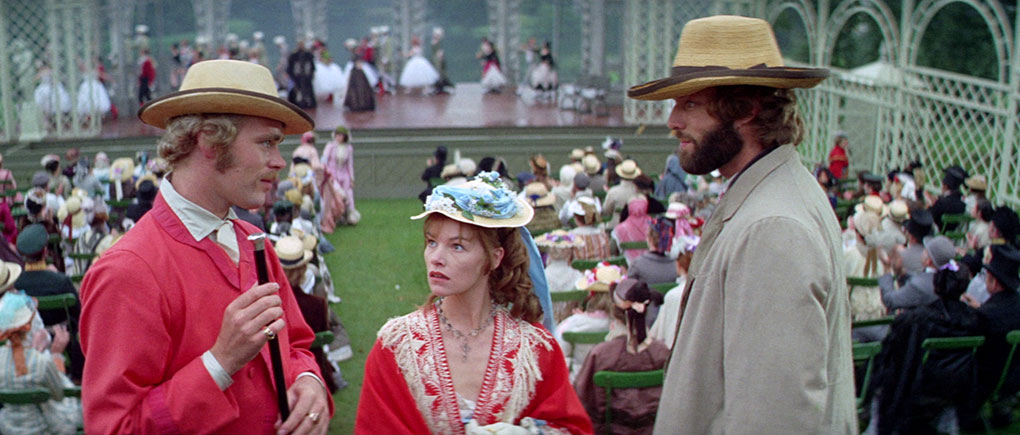
Tchaikovsky purists will doubtless remain unconvinced, but it’s worth pointing out that, despite the impressionistic approach taken by Russell and Bragg and the resulting creative tinkering with history, much of what unfolds here is surprisingly faithful to historical fact. There seems now to be general agreement regarding Tchaikovsky’s homosexuality, and his marriage to Antonina Miliukova fell apart even faster in real life than it does in this film. Events surrounding the reaction of Rubinstein and his colleagues to Piano Concerto No.1 and the stipulation that it should be rewritten are compressed a little here, but otherwise the scene in question is on the money, and the patronage of Nadezhda von Meck and the agreement that they should never meet is factually accurate (one magical moment that I assumed was a filmmaker invention in which the two gaze longingly at each other as Nadezhda’s carriage passes close to the woodland in which Pyotr is walking is apparently a true story). Indeed, much of what we know about Tchaikovsky’s personal life, his emotional state, and how he felt about his music is down to the sizeable amount of surviving correspondence between him and Nadezhda, which were also the primary source for Bragg's screenplay (spoilers ahead, skip to the next paragraph to avoid). Whether Tchaikovsky died after contracted cholera by accidentally drinking contaminated water or whether he did so deliberately remains a subject of discussion to this day (Russell opts for the later, and the moment Pyotr drinks the infected water delivers a kick), and the unfortunate Antonina did spend 20 of her final 24 years in an asylum, institutions whose conditions are generally regarded as barbaric by the standards of today.
Coming back to the film after so many years, I was once again blown away by Richard Chamberlain’s complete commitment to the role of the tortured Tchaikovsky, a performance of extraordinary range and depth that completely shakes off his 1960s TV image as devilishly handsome heartthrob surgeon Dr. Kildare. Indeed, if I had to pick a favourite Chamberlain film performance, this would be it, closely followed by his image-conscious Aramis in Richard Lesters The Three Musketeers (1973) and its immediate sequel, and his rivetingly restrained portrayal of lawyer David Burton in Peter Weir’s haunting The Last Wave (1977). It helps that he was an accomplished pianist, which allows Russell to show rather than hide his hands while he is playing, and while he may be miming he is at least doing so convincingly and hitting (roughly) the right notes on even the most complex compositions. As a long-standing fan of Kenneth Colley, I could happily watch him in just about anything, but he’s excellent casting here, never more so than when throwing sternly disapproving looks, although his fantasy showman’s glee during the 1812 Overture sequence is an unexpected delight. Max Adrian is clearly enjoying himself as the alternately mocking and – when Madame von Meck proclaims Tchaikovsky a genius – sleazily ingratiating as Rubinstein, Christopher Gable carefully avoids overplaying the effeminacy as Anton, and future The Killing Fields screenplay Oscar-winner and Withnail & I writer-director Bruce Robinson shows he was no slouch as a young actor in his early days as Tchaikovsky’s shy young assistant Alexei. In key supporting roles, Polish actress Izabella Telezynska really gets under the skin of Tchaikovsky's patron Madame Von Meck, and Sabina Maydelle brings the sort of layers to Sasha that at one point had me planning a whole paragraph just about the look that crosses her face as she watches singer Olga Bredska (Joanne Brown) perform for Pyotr during the composition stage of Eugene Onegin. But without doubt the crowning glory here is Glenda Jackson’s rivetingly expressive performance as Nina, vividly conveying the desperate loneliness that drives her obsessive pursuit of all the wrong men, and the growing neurosis that ultimately leads to delusions that her appallingly amoral mother (Maureen Pryor) is able to exploit for financial gain. Ultimately, it was Nina that I felt for the most and she is disappointed, abused, and exploited by everyone she knows and thinks she loves – her final, freeze-frame look into the camera haunted me for years after I first saw the film and has now returned anew to infiltrate my darkest dreams. It’s a bold and brilliant performance that I find it hard to imagine being delivered by many others with quite the same range and fearless commitment, and one I still find myself repeatedly revisiting the film to watch and admire.
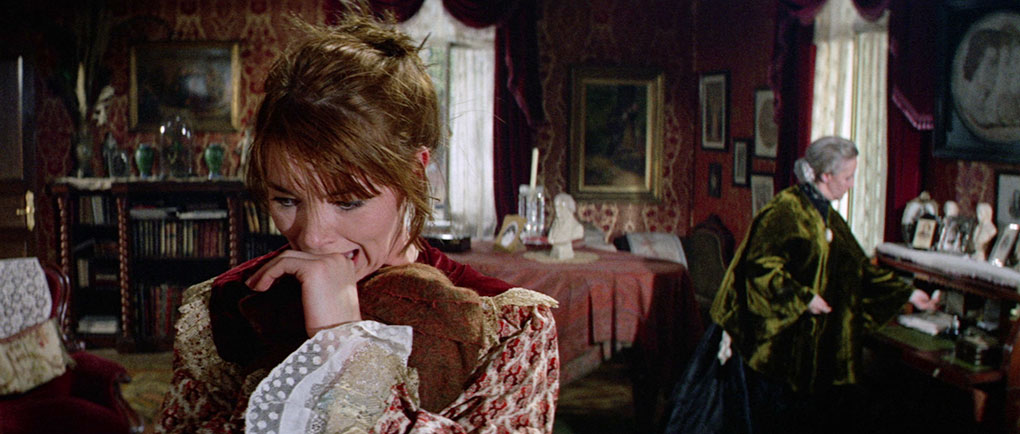
As was so often the case with Russell, on its release The Music Lovers took a critical hammering in some quarters, with the expected prejudicial caning from the usual suspects, led by a particularly hostile Alexander Walker, and even a few respected voices across the pond, with Roger Ebert claiming the film was “libelous not only to the composer but to his music.” That the film was always intended as a personal response to the music of Tchaikovsky and not a straight biography seems to either have escaped its critics – the clue is in the full on-screen title, Ken Russell’s Film on Tchaikovsky and The Music Lovers – or been dismissed as irrelevant, in part because, well, the filmmaker in question was freshly dubbed enfant terrible, Ken Russell. Maybe it’s the passing of time and the commodifying of mainstream cinema, coupled with the reluctance of so many filmmakers to take the sort of chances that were the standard modus operandi for artists like Russell in their heyday, but I adore every gorgeous, imaginative and technically dazzling minute of this extraordinary work. I’ll freely admit that I’m the flipside of critics like Walker, every bit as prejudiced in my way, but resolutely in favour of Russell and his cinema. For me, this was the second great film in a golden streak for the director, made following the acclaim of Women in Love (1969) and shortly before the worldwide controversy of my favourite Russell film of all, The Devils (1971). It didn’t end there. Russell followed this illustrious trio with The Boy Friend (1971), Savage Messiah (1972), Mahler (1974) and Tommy (1975), terrific films all, and while I’ll still go to bat for Lisztomania (1975) and Valentino (1977), it was a brief stint in America that saw him back on absolutely top form with the unexpected duo that was Altered States (1980) and Crimes of Passion (1984). Viewed retrospectively, that’s a hell of a body of work to deliver in an unbroken stream, and The Music Lovers is up there with the best of them. Handsomely often kinetically photographed by master cinematographer Douglas Slocombe and beautifully edited by Russell regular Michael Bradsell, The Music Lovers is exactly the sort of challenging, entertaining, adventurous, and artistically invigorating work that it is sadly hard to imagine being made today.
Sourced from a high definition original delivered to the BFI by MGM, the cleanliness of the print and the clarity of the image make it clear that the film has undergone a digital restoration at some point, the details of which have not been made available. Presented in its original aspect ratio of 2.35:1, and while not always HD-digital razor-sharp, the detail definition is still impressively crisp, particularly on facial close-ups, and the transfer handsomely captures that unique texture that you still only seem to get with celluloid film. Colour is consistently good, and richly attractive when designed to be so – the 1812 Overture fantasy looks glorious – and the contrast is handsomely graded, with solid black levels that do not swallow detail from the shadowed areas. A very fine job.
Two soundtrack options are available, the original stereo as Linear PCM 2.0 and a 5.1 surround remix as DTS-HD Master Audio 5.1. Both have an impressive clarity and a wide tonal range, with Tchaikovsky’s music in particular having a full, rich feel. Purists may prefer the original stereo, but the surround track really does lift it up a notch in every respect and enables the music to really fill the room.
Optional English subtitles for the hearing impaired are available, and handily identify any music being played or performed by name, right down to the specific movement.
Commentary by film scholar Matthew Melia
If you’re new to The Music Lovers, this commentary by historian and senior lecturer in film and media at Kingston University, Matthew Melia, should prove a treasure trove of relevant facts and smart analysis, and even if you’re already a confirmed fan you should find plenty here to get your cineaste teeth into. Melia clearly knows the film well and holds it in very high regard, describing it as an important and unfairly overlooked work, praising the opening scene as a masterpiece of establishment and the 1812 Overture set-piece as a brilliantly made fantasy sequence, and Vanessa Redgrave’s performance as a career best. He intriguingly describes the film at one point as being about the vampiric nature of fame and genius, cites the drunken train carriage ride and Tchaikovsky’s nightmare vision of his cholera-afflicted mother as evidence that this is Russell’s most horrific film, and makes a solid case for why it matters little that it toys with historical fact. He also provides a fascinating and persuasive reading of individual scenes, as well as identifying which of Tchaikovsky’s compositions are on the soundtrack. I’m just scratching the surface of this excellent companion to the film.

It Runs in the Family (20:37)
Ken Russell’s son Alexander Verney-Elliot (aka Alexander Russell) looks back at his father’s film career and his own involvement in it, which began with a small role in Always on a Sunday (1965) – one of the 24 films Russell made for the BBC’s prestigious Monitor arts programme – and includes his role as one of Madame Von Meck’s children in The Music Lovers. He recalls a key scene in which actress Izabella Telezynska hugged him so tightly to her chest that it triggered a trauma that haunts him to this day, but praises the film and specific sequences in it (he describes the train carriage scene as one of the greatest in all of cinema), and confirms that everyone enjoyed working on it. For Russell afficionados, this is a small bounty of behind-the-scenes stories: his dislike of working on Russell’s 2002 The Fall of the Louse of Usher, in part because he believed that his father’s creative juices had run dry by this point; Russell’s claim that it was impossible to direct Michael Caine on Billion Dollar Brain (1967) because he was too wooden; the way he would deliberately create tension on a set to get something unexpected from the actors; a sword fight that Russell had with Oliver Reed that saw him return home with his clothing bloodied; how an offer from Steven Spielberg to come to Hollywood was effectively blown by something he said to his American compatriot; and so much more. Alexander talks about his father’s friendship and collaboration with Melvyn Bragg, suggests his style was closer to European cinema (particularly Federico Fellini) than Hollywood, and intriguingly reveals that Russell had a passion for – wait for it – picture hanging. A terrific inclusion.
Charlotte Brontë Enters the Big Brother House (16:13)
If you’re not a fan of Ken Russell’s later video projects, there’s a good chance that the title of this 2006, mini-DV short will have you mumbling, “Here we go…” With that in mind, what actually unfolds might genuinely surprise you. It’s effectively a record of a short ballet devised and directed by Russell and performed by the students of a school run by respected dance teacher Valerie Jackson, with choreography by Russell and his wife Elize, who also plays the lead role. The central concept of intertwining the lives of Charlotte Brontë and her most famous creation, Jane Eyre, and elements of the reality TV series Big Brother, actually works far better than that description might make it sound, something that only becomes clear when you see the completed work. This is performed on the lawn of the parsonage in which the Bronté family lived, and was filmed by three DV cameras positioned on the periphery, doubtless under Russell’s very specific direction. Despite this constraint on camera angles and positioning, the resulting record is shot and edited with a degree of cinematic flair, but also a pleasing level of restraint that avoids detracting from the performances and the dance. Prior to this is a seven minute, formal documentary section (complete with narration), directed by this film’s editor and one of the three cameraman on the performance (along with Russell and Paul Sutton), Michael Bradsell. If that name rings a bell, know that his many notable editing credits include Culloden(1964) and The War Game (1966) for Peter Watkins, That’ll Be the Day (1973), Scum (1979), Local Hero (1983), almost all of Russell’s finest works (The Music Lovers included), and many more. I really enjoyed this, in part for the rare peek behind the scenes it offers of Russell the dance director at work, and for the public performance of the completed ballet.
Galina Ulanova in ‘Swan Lake’ (4:17)
An 1940 film record, complete with its share of film wear and minor damage, of legendary Russian ballerina Galina Ulanova, who partners here with Konstantin Sergeyev to perform a dance to Adagio from Tchaikovsky’s Swan Lake. Straightforwardly filmed from a theatre audience viewpoint, this should prove a treat for fans of classical ballet, and while I’ve never really connected with this distinctive form of dance, it’s hard not to marvel at the extraordinary grace, agility, precision and fluidity of movement on display here.
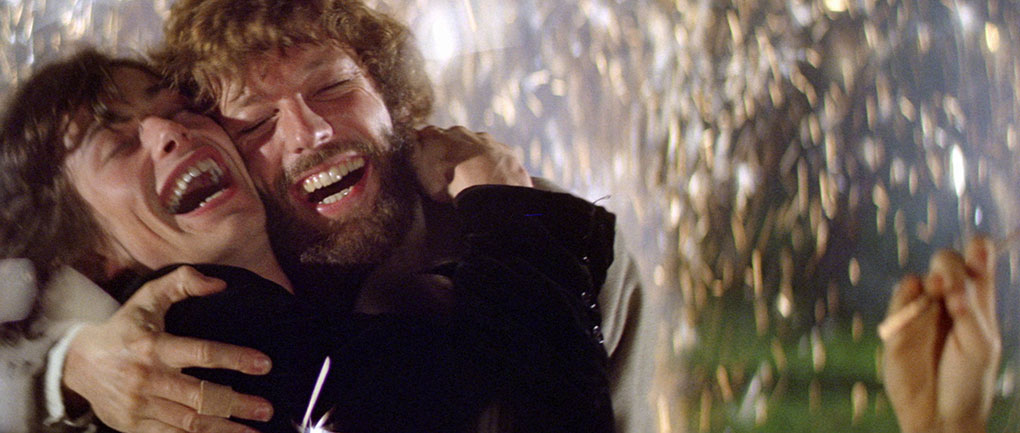
Musical Highlights from USSR Today (10:20)
Edited highlights from three editions of the Soviet newsreel USSR Today from the mid-1950s, which the English narration suggests were originally intended for export. Each clip is based around music, sometimes accompanied by dance, with Tchaikovsky being a key figure of interest. A tour around the composer’s former home leads to a performance of his Sixth Symphony by the State Symphony Orchestra of the USSR to mark the 50th anniversary of his death; young people celebrate the new year by enjoying ballet, music and dance in the Grand Kremlin Palace; a conservatoire student plays a Tchaikovsky composition on the piano; and a man finishes work and heads off to participate in a televised orchestral performance. As ever with such archive material, this is historically fascinating.
The Guardian Interview: Melvyn Bragg (76:27)
This Guardian interview with novelist, TV presenter and The Music Lovers screenwriter Melvyn Bragg was conducted by respected author, playwright and screenwriter Ronald Harwood (whose film credits include The Dresser, The Pianist, and the criminally undervalued Operation Daybreak) before an audience at London’s National Film Theatre in 1988. Despite the breadth of Bragg’s career in the arts, and Harwood’s own introduction in which he praises Bragg’s talent as a novelist, the focus here is almost exclusive on his work as presenter, producer and series editor on highly regarded ITV arts series, The South Bank Show, which first launched ten years previously to this interview. Questions about how the show came about, the difficulty of striking a balance between coverage of the artist and their art, the aim of arts programmes in general and this one in particular and more are answered in almost forensic detail by the confident and knowledgeable Bragg. The theme set by Harwood continues once we move on to the audience questions, which are once again focussed largely on The South Bank Show, its varied guests, and its handling of its chosen subjects. Impressively, when challenged on the quality of a second programme on Paul McCartney, Bragg addresses all of the points raised without becoming defensive or dismissing them as unfair or irrelevant. I get the feeling that sitting down with him for a discussion on just about anything arts related would be as entertaining as it would be educational. The nearest The Music Lovers comes to getting a mention is when Bragg briefly mentions writing the Monitor episode The Debussy Film (1965) for Russell, then quickly notes that he “wrote another film for Ken.” He does have an interesting story about how superior the 153-minute first edit of Karel Reisz’s 1968 Isadora Duncan biopic Isadora was to the 131-minute version we eventually saw and how magnificent Vanessa Redgrave was in the unexpurgated original, and reveals that he was amused by his Spittin’ Image puppet, even imitating the squeaky voice that the show saddled his character with.
Costume Designs (2:00)
A rolling gallery of original sketches made by Shirley Russell for the design of costumes for the key female characters, which were supplied for scanning by Alexander Verney-Elliot. A valuable inclusion.
Trailer (1:25)
A workmanlike but not that inspiring trailer whose cheerless narrator gives the impression he’d rather be somewhere else.
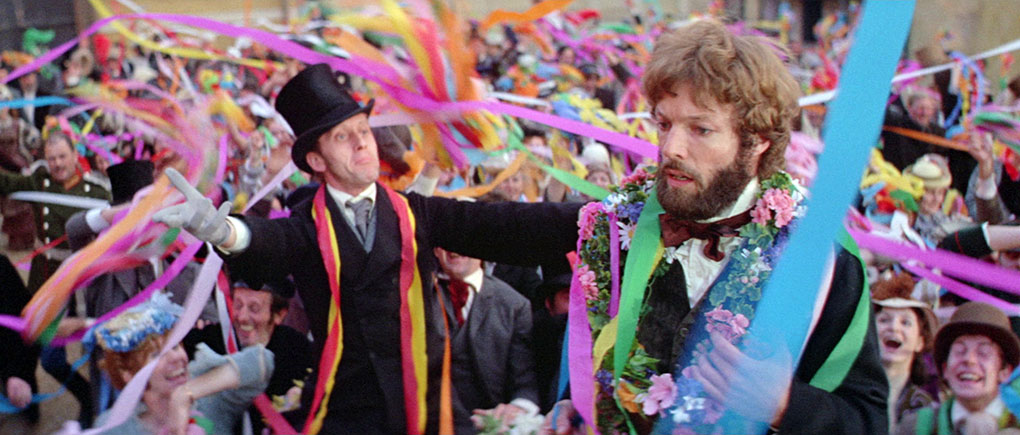
Booklet
The accompanying booklet feels like an extension of the disc itself, including as it does written pieces by two of the key contributors to the on-disc special features. Leading the way is an excellent essay by commentary provider Dr. Matthew Melia, with particular focus on the critical response to the film and Russell’s work in general. I did wince a little when I saw that Melia had quoted the exact same snippet that I had sourced from Roger Ebert’s review, making it look once again as if I’d simply borrowed it from here instead of doing my own research (honest, guv). I needed a brief pause to completely get my head round From Despair to Where? Richard Chamberlain and the (Dark) Romantic Russellian Male by Caroline Longhurst, which takes an intriguing look at, “a spectrum of multilayered fragmented masculinities, with an emphasis on corporeality that notably disrupts the contemporary English realist tradition” in Ken Russell’s cinema, with particular emphasis on Richard Chamberlain’s performance in The Music Lovers. The more straightforwardly titled Filming with My Father sees Russell’s son, Alexander Verney-Elliot, cover much the same ground as he does in his on-disc interview, although specific details are expanded on here. As ever, full credits for the main feature are provided, although again without the running time, country of origin and year of production, all of which are listed for all of the special features. These are also each accompanied by a short summary of their content, the most substantial of which is for Charlotte Brontë Enters the Big Brother House and is most usefully written by Lisi (Elize) Russell.
As a long-standing fan of the cinema of Ken Russell, The Music Lovers is one of those films that I feel no inclination to be fully objective about. One of the biggest kicks I’ve had in the two decades of running this site came when Camus and I were given the chance to briefly meet and interview Russell back in 2009, and I would have given a much to have been able to spend far longer with him and discuss more of the films from this golden period of his career. It’s great that they are now starting to get the sort of Blu-ray treatment they deserve (if only Warner would let someone have a stab at the director’s cut of The Devils), and the BFI have done a bang-up job here, with a fine transfer, an excellent commentary, and some fascinating supporting features. Some musical purists may still balk, but I adore this film and the disc is a beauty. Highly recommended.
|